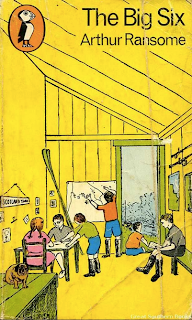Back on the Norfolk Broads, it was a pleasant surprise to find The Big Six much more enjoyable than I remembered, though again there is a bit of a slow start while the mystery is set up and the crimes committed. But once the Ds arrive, the story picks up pace. This really is Dorothea's shining hour. It's she, with her novelist's gaze, who has the psychological insight to predict what the villain will do next.
'You'd never think that Dot got such a head on her,' said Bill, as they climbed over the fence.
The three young Death and Glories are agonisingly slow to realise that they're being framed, and the reader (along with Dot) solves the 'mystery' much more quickly than they do; however, the delight of the plot is in trapping the villain and gathering the proof, rather than guessing whodunnit. It was rather shocking to be reminded what a faff taking photographs used to be, in the days before we could whip out our phones -- the flash, the exposure, the shutter speed, the chemicals, the darkroom -- it's slow and fiddly and cumbersome and frankly I'm not sure I could be bothered. Perfect for Dick, though.
The Big Six (named after the 'Big Five' murder detectives of Scotland Yard, though this is never explained in the book) is a lot of fun.















I found it slightly unbelievable how readily the locals believed that it was the Death-and-Glories letting the boats off, given they'd known them all their lives, but I suppose you just have to accept that sort of thing in a childrens' detective story. The photography details are fascinating and I love the moment when they are able to produce their definitive proof - one advantage of all that faff is that it really was proof - nowadays the children could produce a photo-shopped image of anyone doing anything on their phones and it wouldn't prove anything! There's some lovely touches of Ransome humour throughout this book, especially the moment near the end where the old man asks who had caught the whopper of a stuffed fish, and when told it was the boys, he shakes his head sadly, saying poor boys, so young and nothing left to live for.
ReplyDeleteYes, there is some lovely humour -- I love it when they try to smoke the eels, and when Bill sets the pudding on fire with metho! 'Again and again they helped themselves to sugar and at last the helpings of pudding disappeared...' 'Nothing left to live for' is gorgeous.
ReplyDeleteIt did seem very unjust that the D&Gs copped all that blame, especially when it was Tom who did the first casting-off. But necessary for the story.